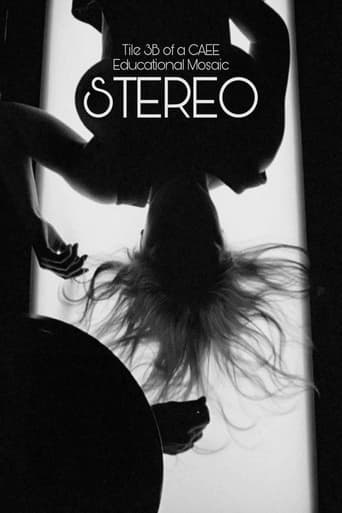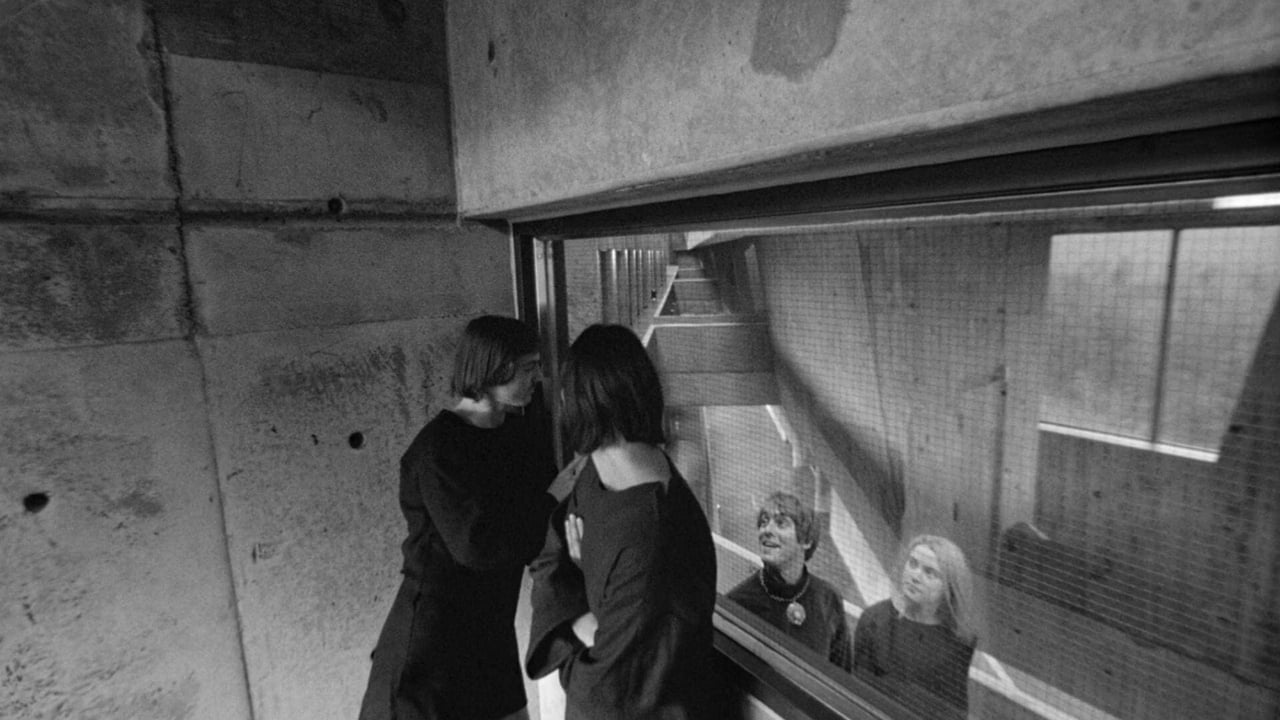Woodyanders
Done in a very cold and clinical style, with no direct sound, droning narration that's overloaded with pretentious pseudo-scientific jargon, and great use of a fantastic sprawling location, David Cronenberg's 65-minute debut feature about an experiment on increasing telepathic psychic abilities amongst several volunteer test subjects with unexpected dangerous side effects makes for decidedly rough going, but still manages to impress due to its striking black and white cinematography and a wealth of fascinating ideas that could have benefited from a stronger presentation. The lack of sound proves to be a huge problem, as whole sequences that transpire in total silence are alas positively agonizing to sit through because they seem to go on for an excruciating eternity. Moreover, the glacial pacing certainly doesn't help matters at all while the lack of characterization ensures that the volunteers for the experiment come across more like distant objects than sympathetic human beings. Fortunately, the cast still manage to contribute remarkably expressive pantomime performances as Cronenberg explores his trademark themes of identity, sexuality, and science gone amok. So, it's definitely not top Cronenberg, but nonetheless serves as an intriguing precursor to such latter works as "Shivers" and especially "Scanners."
tieman64
(Due to IMDb word limits, Part 1 of this essay can be found in my review of "Eastern Promises") Even when Viggo enters the low tech world of the East, he is astoundingly high tech. In a world of knives, Viggo is a cyborg, our post "Existenz" society already producing biotechnological entities. Think the film's cunning ending: Naomi Watts - already identified as a butch lesbian by David Lynch - becomes not the simulation of heterosexual domesticity seen at the end of "A History of Violence", but a husband-less, (she lives with uncle, mother and child) poster-girl for the androgynous, fragmented future of digital capitalism.By inter-cutting Naomi's goofy simulacrum with a scene of Viggo sitting mournfully at a table, the following question arises: at what price does Viggo establish his neutral status? Does he lose humanity in the process? Is this loss negative? The film's ending, in which Viggo is revealed to be both criminal and cop, good and evil, but neither gangster nor cop, neither good nor evil, suggests a profound loss of humanity. Motionless and seemingly on the verge of tears, Viggo now resembles Verhoeven's "Robocop", reminiscing about what it once was like to be human. In other words, in accepting his neutral status, Viggo removes himself from Naomi, resulting in a kind of further androgynous disassociation. By living in the network society of the West, you're already atomised and mechanised. When you buy cola from the dispenser, you're servicing the Machine, you are its corporeal extension, just as Viggo is now the limb of two warring, nationalist machines. Between one socio-technological agency dominating the other, between DNA programming and competing sociocultural and economic structures that build on this biological instinctive substrate, the film says, there's no place for human subjective agency. As Viggo mourns, "I am neither alive nor dead. I've been living in the zone since I was fifteen." In a scene in which rival football hooligans macho-stomp through a cemetery, we sense the film's repressed xenophobia and nationalist passions. What "Eastern Promises" promises is a new Cold War: America and the Eastern World in civilisational clinch, in which the West will righteously and bravely undergo a little barbarism, a little queerness, in order to protect its children. And propping up this noble fantasy will be a legion of little Viggo's, socially and psychologically fragmented but better off than the dirty few who are seduced by the false promises of the West only to end up as property at best, dead or sex workers at worst.What Cronenberg unintentionally captures is the shift away from Michel Foucault's "disciplinary society" (the film's East) and towards a new sort of social formation, which Gilles Deleuze calls the "control society" (the film's West). Whilst the "disciplinary society" operates by organising major sites of confinement (family, school, hospital, factory, prison etc) in which individuals are always going from one closed site to another, each with its own laws etc, the "control society" breaks down all sites of confinement such that ultra rapid forms of apparently free-floating control take over.The differences between these two forms of social organisation, between Viggo and the film's Mafia Chief, are numerous. Where the disciplinary society was analogical, the control society is digital. Where the disciplinary society was traditional and focused on stability, the control society stresses movement, fragmentation and capital. Where the disciplinary society is closed, traditional and hierarchical, the control society is open, fluid, schizophrenic and rhizomatic. Where the disciplinary society applied rigid molds as forms of confinement, the control society is always in a state of flux, always destroying and rebuilding. Likewise, while the disciplinary society molds the individuality of each person, the control society addresses us instead as what Deleuze calls "dividuals", identities constantly multiplied, decomposed and recomposed on various levels (medical records, credit cards, internet, email, passwords replacing signatures, each identity used for different purposes etc).This is best seen in the way the film's Mafia Chief mourns the way London "infects his macho son", "breaks him down" and "rebuilds him queer" and the way the Mafia relies on codes, tattoos and rituals to "rigidly build" its own people. In contrast, Viggo not only belongs to the control society, but has mastered it absolutely. He is able to ride the flux, precisely because he's supremely disassociated; alienated from mind and body.Everyone is subject to the master signifier. To stay alive in the game one has to renounce a measure of pleasure and power; to be castrated, whether male or female. So though "Promises" start out with the feminization motif - the knife slice, the bleeding vagina, the whorification of Viggo, the queering of the son – it, along with Cronenberg's entire filmography, gradually moves to outright impotence. The son is a voyeur, can only watch, can't do anything for himself, can't even kill a baby, while the mother (Naomi Watts) is barren and Viggo has been neutered by the Big Other, his body inscribed with tattoos which attest to a false history, false "tags" of ownership etc. Supremely divided, Watts and Viggo are the new "sucessful" mother and father, "parenting" a child that doesn't belong to them, without being married, living worlds apart, without even knowing one another. In this way castration is redefined in terms of territorialization. Territory is incessantly "deterritorialized" by the unspoken logic of global capitalism, everything is broken down and fragmented, but always allowing for the free flow of desires toward creation/procreation and production/reproduction, which we see in the last scene. The family is nobly destroyed, and what remains is only enough to keep it productive.9/10 – Though one of Cronenberg's best, "Promises" is too tightly packed, lacking any critical distance or space for a Western audience (whom the film primarily critiques) to reflect properly on its fantasies.(For Part 3 of my Cronenberg quest, see my review of Cronenberg's "Crash")
jonathan-577
Cronenberg's first feature is a bizarre, distended thing, whose real star is the location. I'm guessing we're looking at York University campus; regardless, every obscure tableau he stages is self-consciously dwarfed by the forbidding institutional architecture that houses it. The sporadic voice-over that occasionally rises from the silence suggests that we're watching a narrative about a sexual telepathy clinic whose mandate goes seriously awry. If you concentrate, you can see how this relates to the on screen shenanigans in a linear and probably even preplanned way - it's not just precious mannerisms, although it is that as well. The film makes the most of its visual material with a special thing for fisheye pans, and it runs free love through a dystopian sci-fi wringer in a way that will be familiar to fans of his later work, even including a giveaway throw to "Scanners". But after a while it does get tedious, and while Cronenberg's iconoclasm remains enjoyable and felt, minimalist sci-fi on no budget was always easier to pull off in print than on screen.
OldAle1
2nd viewing. Alongside "Fast Company" on this fine Anchor Bay presentation are Cronenberg's first two experimental low-budget science fiction features, both filmed on a University of Toronto site in Scarborough, Ontario. I'd seen the first, Stereo on a poor-quality bootleg years ago and am pleased to report that not only does the film hold up to a 2nd viewing, the transfer is quite fine. The voice-over narration to the silent-shot black-and-white footage certainly lends some verisimilitude to the pseudo-documentary conceit of an experimental psych lab devoted to telepathy. Various colleagues of the para-psychologist Luther Stringfellow discuss his experiments and theories and how they bear out in a test group of young subjects apparently capable of various ESP abilities; we watch characters wander around alone or interact with each other individually or in small groups, and their strangeness (in particular one young vampirically-dressed man of rather odd visage) alternates between a sort of normal weirdness and something....else. Are they in fact gifted? Is the narration actually in sync with what we are seeing? Watch it and find out; uncommonly fascinating, if somewhat obtuse. Worthy of comparison with Greenaway's early pseudo-documentary shorts.


 AD
AD
